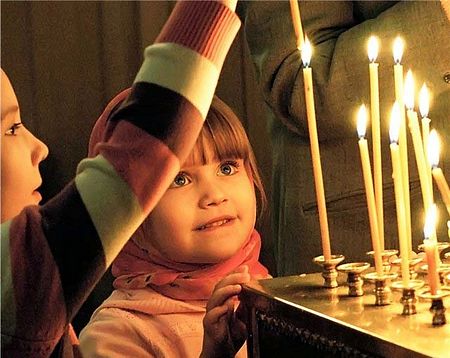When I was a newly ordained priest, my bishop told me that the secret of happiness is to have a clean conscience with God. If God is happy with you, then you will be happy and be at peace with yourself. As a result you will have peace with others as well and you will be happy. Fr. Alexander Schmemann did not agree with the philosophy of separating the sacred from the profane. Father believed that all things in this life are holy and that all things are good, having been sanctified in Christ. Therefore, everything in this life affects our spirituality and our salvation. That said, I would like to offer some thoughts in general about human happiness. The notion of happiness is generally understood differently from the Christian viewpoint when compared to the secular point of view. True happiness involves faith, prayer, reading and learning Holy Scripture, fasting, repentance and attendance of Divine services and participation in the Holy Mysteries on a regular basis. However, in some instances the two viewpoints do not oppose each other but actually are in agreement.
Unless you are independently wealthy, we must all work in order to finance the usual needs of everyday life. Lawrence Welk, the famous American band leader and television personality, had his own prescription for happiness. He writes in his autobiography that the secret of happiness is to choose a career that matches your passion, that matches what it is you love to do. If you are fortunate to be able to have such a job, then all of your time spent “working” will not seem like drudgery but will instead fill your day with joy and happiness. Even so, I believe, that we can never fully escape some aspects of work or labor, no matter what we do, that will seem tedious and boring. It is simply the nature of the beast. I have loved the Church since I was very young. Although I am blessed to be a priest and to work within the parameters of my heartfelt passion, I still sometimes fall into the sin of complacency. In addition, there are aspects of my duties as a parish priest that I consider to be tedious and boring.
We have established that the average person spends a great portion of their life employed in some capacity. A lot of time is also spent taking care of mundane but necessary things: washing, cleaning, errands to the grocery, repairing and fixing, shopping, visits to the doctor, sleeping, eating, etc. However, part of the prescription for happiness in our lives can also be to think creatively and outside of the box and to find ways to make even the mundane and necessary activities of life into activities that are interesting and enjoyable, or at best useful for the salvation of our souls. For example, we might have shortened or not said our morning prayers on a particular day because we were late for work. However, if on that same day we find ourselves sitting in traffic, instead of listening to the radio while we wait, or getting annoyed and impatient and being angry, why not seize the moment and make it into a positive? Why not use it as an opportunity from God to say our prayers? Even if we had read our rule of prayer, shouldn’t we listen to Paul’s epistle to Timothy and “pray without ceasing?” Whenever we are forced to wait and be patient, whether it is because we are sitting in traffic or perhaps standing in line at the bank or the grocery, why not use the time to say the Jesus Prayer? What greater happiness or joy can there be for us than to have the name of Jesus in our heart?
When all is said and done, after all of these necessities of life are taken care of, relatively speaking, there is a small portion of free time left for ourselves. This is our golden and special time and we have worked hard to earn it. The question is, how will we use these precious moments? We can squander and waste that time. That is one choice. If we choose to allow ourselves to merely float through life like automatons without specific goals or plans, then wasting our free time would fall within that mindset.
Sometimes we have plans and goals but we often deceive ourselves by imagining that some day in the future we will do this and we will do that and make plans for a future that may never come. I’m not saying that it is is wrong to make plans and provisions for the future, but we should not put all our eggs in one basket. Not planning for the future would be foolish and irresponsible. However, that does not solve the problem of what to do with the gift of the free time that we have now.
Consider this: when I had secular employment I had a supervisor who died two weeks after he retired. This begs the question, how do we know that this future time will ever even come? I am reminded of the person who never goes to Church or never goes to Confession and says, “I will go to Confession on my death bed. I will make my peace with God on my death bed”.
Metropolitan Anthony Khrapovistsky, in his book on Confession, writes that to the person who says this I ask, “How do you know that you will even have the luxury of experiencing a death bed? How
do you know that you will not die swiftly and quickly, that death will not take you in the blink of an eye?” No one knows. Remember the parable of the rich man who enjoyed a plentiful harvest during a famine? While everyone else was going hungry, his bright idea was just to build bigger barns for himself so that for future years he could eat, drink and be merry. He had an abundance, extra grain that he didn’t plan for or need. Yet while his fellow human beings went hungry because of a famine, it never occurred to him to share his abundance and to help his neighbor. That night the Lord came to him and said, “You fool! This night your soul will be required of you; then whose will those things be which you have provided” (Luke 12:20)?
No one should plan to have a death bed. The time to go to Church and the time for Confession and to make peace with God and our neighbor is now and not some other time. And really, if we don’t care about God now, then what will change later on? Will something magical occur and cause us to change our attitude at some imagined future time? Can we turn faith and repentance on and off like a faucet? Would such a Confession even remotely be sincere and unto our salvation? If we have a legalistic and scholastic attitude about it, wouldn’t such a Confession be instead to our judgement and condemnation?
This needs to be attended to and fixed at no other time but now. The future is not guaranteed for anyone and is always an unknown. All that is certain is today. Tomorrow is a guess and a hope. We must resolutely decide that the time for fulfilling our bucket list is now and not some day in the future. As the saying goes, we must “be here now”. If we hem and haw, we can always find some reason or excuse why the time is not now to do the things that we should and would like to do, but that we must wait for some future time that may never come. Like one priest I know always likes to say, “Just do it.”
My Brothers and Sisters, please just do it, and stop making excuses. Your happiness and your salvation depends on it. The existential purpose of spending so much time in our lives taking care of daily necessities is so that we may earn the gift of the precious time to do that which is most important and necessary for us. What brings more happiness, besides God, than being with our children, our spouses, our parents and all of our loved ones? Remember the song by Harry Chapin “The Cat’s in the Cradle”? It is such a sad song and it always makes me cry. Its message is profound. One day our children will grow up, marry and have their own children, move away and now they will be busy with their own lives.
The time will come quickly when it will be their turn to spend time doing the mundane things that we ourselves spent our entire lives doing. At that time it will be too late to be with them and do things with them when we decide that it now is convenient for us, when we decide that we are no longer too busy to spend time with our children. And all that time when they were youngsters they were always waiting for us to spend time with them. All children crave and need this, whether we realize it or not. Sometimes they even resort to so-called “negative behavior” in order to get our attention and to make a connection with us. Better a “negative” connection than no connection at all. How sad it is that we force our children to resort to this because we consider ourselves to be too busy with more “important” things, so we neglect being with our precious children and giving them our undivided attention.
This is vividly expressed in a portion of the lyrics from Harry Chapin’s song***:
My son turned ten just the other day
He said, thanks for the ball, dad, come on let’s play
Can you teach me to throw, I said, not today
I got a lot to do, he said, that’s okay
And he walked away, but his smile never dimmed
It said, I’m gonna be like him, yeah
You know I’m gonna be like him
And the cat’s in the cradle and the silver spoon
Little boy blue and the man in the moon
“When you coming home, dad?” “I don’t know when”
But we’ll get together then
You know we’ll have a good time then
The father in the song turns his son down so many times. The father’s neglect of his son doesn’t prevent the boy from loving, admiring and looking up to his dad. I’m sure that the father loves his son very much. However, it is so easy to get caught up with the hectic and time consuming activities of our daily lives. They consume so much of our attention and time. Meanwhile, our children are rapidly growing and before we know it they are already young adults. Time does not stand still. Finally, in retirement, the dad is lonely and has a lot of time on his hands and now he decides that he wants to spend some time with his son. Sadly, this is what happens:
I’ve long since retired and my son’s moved away
I called him up just the other day
I said, I’d like to see you if you don’t mind
He said, I’d love to, dad, if I could find the time
You see, my new job’s a hassle, and the kids have the flu
But it’s sure nice talking to you, dad
It’s been sure nice talking to you
And as I hung up the phone, it occurred to me
He’d grown up just like me
My boy was just like me
Our parents eventually age and depart from this life, and no longer will it be possible to call them or to visit with them. The time will come when we will no longer be able to see their faces, or hear their voices or feel their warm and loving embraces. We need to take action now before death and the finalities and separations which are part of life rob us of the luxury to enjoy the special golden moments of life which should be more important to us than anything else and at the top of our list of goals and priorities. Don’t waste this precious gift called life. As Fr. Seraphim Rose used to say, “It is later than you think.”
_____________________________________________
*** Songwriters: Sandy Chapin / Harry F. Chapin
Cat’s in the Cradle lyrics © Warner Chappell Music, Inc
Recorded by Harry Chapin in 1974.

















